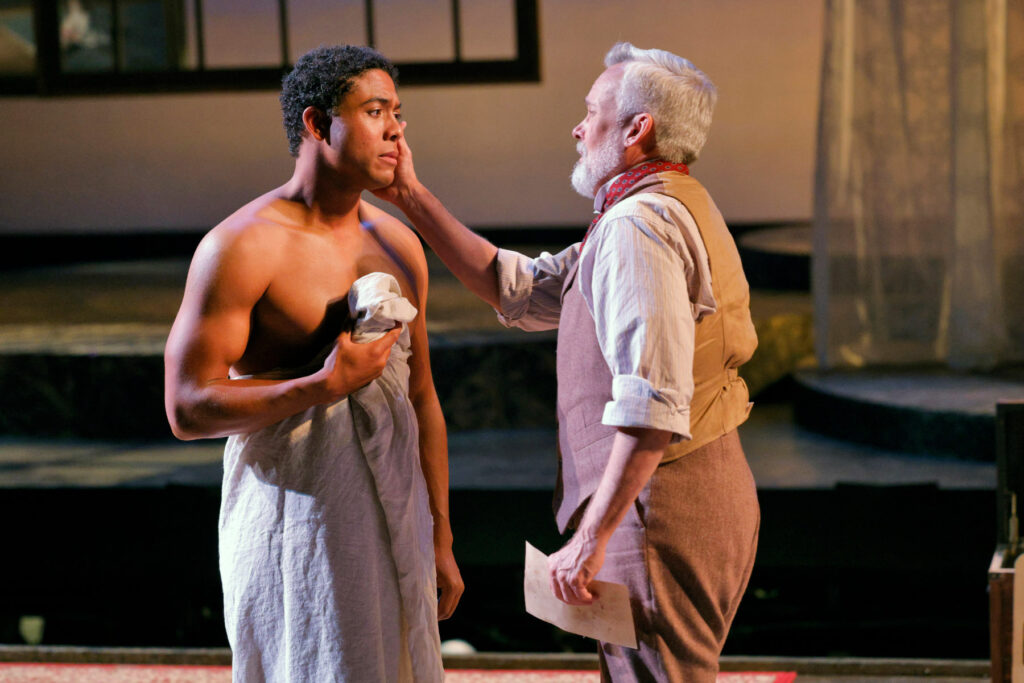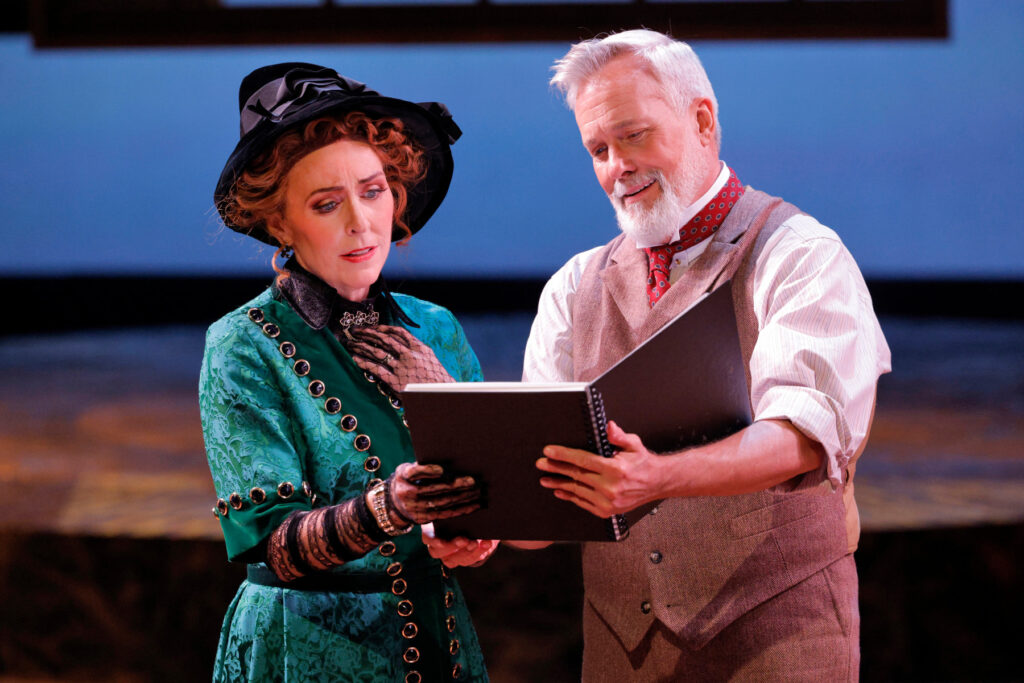Des Moines Metro Opera’s World Premiere of Damien Geter and Lila Palmer’s American Apollo could hardly have been more of an “occasion.”
This intriguing musical exploration of the artistic and personal relationship between famed New England artist John Singer Sargent and his model Thomas Eugene McKeller has a lot going for it, not least of which is the abundance of prodigious talent evident in composer Geter and librettist Palmer.

I was fortunate to have experienced the workshop sketches presented two seasons ago when I wrote:
“Mr. Geter’s work is justifiably capturing ample notice on the national scene, with numerous premieres that are being received with enthusiastic admiration. His biography posits that the composer ‘infuses classical music with various styles from the black diaspora to create music that furthers the cause of social justice.’
Based on this brief sampling, I do not recall very much that was aurally drawn from any particular ethnic influence. What I did experience was a readily accessible, usually tuneful, emotionally satisfying pastiche of operatic styles up to and including bel canto coloratura. Although there are (also) eclectic hints of Britten, Torke, Stravinsky, and even Ricky Ian Gordon.”

Upon experiencing this expanded version, I might say that Britten and Stravinsky were now far less apparent than Torke and Gordon, there were slight evocations of William Schuman and David Diamond, and there were even (and I mean this very positively) occasional suggestions of Andrew Lloyd Webber’s best effects in Aspects of Love and Evita. All of that said, Geter’s sound palette and approach is very much his own distinct amalgamated voice, and most often, invigoratingly fresh.
He does like his undulating figures that are hypnotic in the way that Phillip Glass uses arpeggiated figures. If memory serves and my ear was accurate, there was a repeated underpinning of a “do-mi-fa-do-mi-fa-do-mi-fa” pattern that was quite aurally seductive. For its many strengths, I still did not hear much ‘African diaspora’ in the writing, other than perhaps the occasional suggestion of a choral workers song, a suggestion of jazz, or a few moments of religious reflection.
In 2022, I had also written:
“The underpinning of social justice fell more to Ms. Palmer’s succinct and poetic writing. That she has fashioned some very affecting, witty, and informative interactions. . . is commendable, given there is not all that much known about Thomas McKeller (1890-1962). He was discovered to have been the African American model for painter John Singer Sargent (1856-1925), who is considered the foremost portraitist of his generation. The two men struck up a chance acquaintance which led to Sargent’s hiring of McKeller, who became the artist’s principal model in this country. Curiously, Sargent used him as a body model which he ‘lightened’ for white gods and allegories, notably in murals at Boston’s Museum of Fine Arts, and Harvard University.”
Since then Ms. Palmer has quite masterfully fleshed out the possible character relationship between Sargent and McKeller. She has pieced together a rather convincing probability that the two became intimate, and that an initial raw, suppressed physical attraction by the homosexual Sargent for this model, grew inevitably to a co-dependent emotional and professional bond.
Any good tragic love story is informed by its challenges, and there were plenty in store, from McKeller’s financial reliance on Sargent, to the racial prejudice of the time, to the negative view of homosexuality, to the perceived financial and emotional abandonment of McKeller by Sargent of two occasions, to Sargent’s “erasure” of McKeller’s identity by “whitening” his image for public display.
In the workshop, the most complete character at the time was arguably Sargent’s sympathetic patron and confidant, Isabella Stewart Gardner. She remains a wonderful accent in this full story, and has been given a bit more stage time, even while McKeller and most especially Sargent have been radically expanded and developed. The only other workshop performer was the miniscule role of Sargent’s chauffeur. Jimmy, and Ms. Palmer has plussed up the current version by nine cast members, including some doublings.
And what a fine cast it was. Justin Austin’s rising star seems to be taking him all over the map these days, and with good reason. As Thomas Eugene McKeller, Mr. Austin’s suave, luxuriant baritone filled the house with beautifully judged effect, and robustly convincing emotional investment. Mr. Geter exploited this singer’s dynamic upper range to its maximum effect and Austin rose to meet every expectation, lashing out some high-flying climaxes with fearless power. This was a galvanizing, Herculean performance
William Burden’s peripatetic vocalizing has graced virtually all of America’s major stages and nearly every important overseas house all well. Easy to see why as his flexible, malleable tenor easily encompasses not only the standard lyric tenor roles, but also is much sought after for his skilled specialty in new works. On this occasion, as John Singer Sargent, Mr. Burden sings with a poised pristine tenor, that is his to command with assurance and nuance. Sargent is alternately given some very challenging arching phrases to surmount, some fairly angular intervals, and some wrought emotional outbursts. Whatever the task, this seasoned singer conveyed a beautifully judged impression.
World class soprano Mary Dunleavy remained a model of deluxe casting as Isabella Stewart Gardner. Two years have done nothing to diminish the delights of her glistening vocal delivery, and if anything, her insouciant chatter, effortless fioratura, and infectious vocalizing were more appealing than ever. She was responsible for many chuckles as a counterpoint to the somber storyline. In the important scene when Gardner reunites McKeller and Sargent after an estrangement, Ms. Dunleavy showed that she was also capable of more weighted tone and moving gravitas. Her impersonation and vocalizing were delectable, and when the character disappeared she was missed.
The minor and cameo roles were similarly performed with consummate skill and distinction. Tenor Alex McKissick was memorable as Sargent’s spurned model and lover, Nicola d’Inverno, his substantial, full-throated singing conveying power, menace, and regret. As McKeller’s sister, Ida Mae McDonald, Tesia Kwarteng enlivened this substantial secondary role with an appealing pert presence, and a scintillating, floated lyric mezzo-soprano. Florence McKeller, Thomas’s mother, was embodied by the richly characterful mezzo-soprano of Kendra Faith Beasley.
Music Director and Principal Conductor David Neely led this World Premiere performance with joyous aplomb and stylistic savvy, just hours after putting down his baton leading a powerhouse of a Salome. Under Maestro Neely’s leadership Mr. Geter’s musical intentions and motivic inventions were served up with loving gusto and high level musicianship by a twenty-five piece chamber orchestra that made the strongest case possible for this newly minted work.
At first glance, Steven C. Kemp’s design concept looked like it might have been a bit too minimal. A framed projection screen hung upstage over a rather unremarkable placement of three round platforms, with dust-covered furniture dotting the apron atop a scattering of more Asian rugs than you might find in a Turkish carpet shop. However, that spare impression dispelled as soon as the downbeat occurred, when creative juices flowed freely. It was almost literally a case of “Lights. Camera. Action.”
The still and film projections proved to be a highly satisfying parade of imagery that greatly enhance the changing locations. Once we were in Sargent’s studio, the dust covers came off to reveal carefully selected period furniture that conveyed a wealthy milieu that contrasted tellingly with the settings of the boarding house, the battlefield, the jazz club, and the lower class homes. Furniture pieces were moved fluidly to create Ida Mae’s house.
Jacob A. Climer’s costumes were his usual high standard, ranging from handsome and elegant society dress to the grittier attire for the lower class laborers and soldiers. The posing strap that Mr. Austin wore confidently, winningly and tastefully conveyed the essence of the nude model sessions. Bridget S. Williams repeated her success as Apollo lighting designer, and reveled in the opportunities made possible by the resources available in the Pote Theatre that were not at her disposal at the workshop in the Des Moines Art Center auditorium. She took advantage of the expanded number of instruments to greatly enhance the dramatic mood and focus the storytelling. As is her wont, wig and makeup designer Brittany V.A. Rappise’s artistic touch was reliably apt.
Director Shaun Patrick Tubbs worked wonders making this piece come together to convey a cohesive narrative. Made up of disparate scenes and shifting locations, Mr. Tubbs awesomely kept his (and our) eye on the prize, which was the engaging tale of the burgeoning unlikely relationship between the wealthy white artist and the humble black model he lured from his job as an elevator operator.
While he staged the accent background scenes, minor character relationships, and historical tidbits with assured acumen and pleasing theatricality, he never allowed these to distract from the love story that is the beating heart of the piece. That the singers playing Sargent and McKeller had such great chemistry and were so at ease with honestly portraying the hugging and smooching, is not only a credit to Tubbs, but also to the skilled work of the Intimacy Coordinator, Stephanie Schneider.
There is no question that American Apollo has legs and crosses the finish line. That acknowledged, I must say that there were extended solos, dialogues, confrontations and musings when I felt it was running in place for longer than necessary. There were frequent stretches, more in Act I than Act II, when I got the point. The dramatic beat was reached. The churning music wore on. I waited, nay longed to lurch forward. So without impugning the quality of this significant achievement in any way: I think there is truly knockout 90-minute one act opera in what is now an enjoyable, if occasionally too ambling two act work.
But. . . what an “occasion” it was with lectures, receptions, meet and greets, and even a VIP guest in attendance who is Thomas Eugene McKeller’s sole surviving relative. The whole project resonated with artistic excellence, important social commentary, awesome commitment, and abundant community pride in this eventful World Premiere.
It is a testament to the power of the message of love and inclusion, and the quality of the talent involved, that when the stage lights dimmed at the end of the performance, the SRO audience rose as one in the dark, and didn’t wait a moment to launch into a teary-eyed roar of approval that grew into a prolonged, emotional ovation. An “occasion,” indeed, and one to be treasured.
James Sohre
American Apollo
Music by Damien Geter
Libretto by Lila Palmer
Cast and production staff:
Thomas Eugene McKeller: Justin Austin; Walter: Antonio Domino; George: Isaiah Traylor; Clarence/Master of Ceremonies: Shyheim Selvan Hinnant; John Singer Sargent; William Burden; Ida Mae McDonald: Tesia Kwarteng; Willie McDonald: Daniel Rich; Florence McKeller/Mrs. Smithson: Kendra Faith Beasley; Isabella Stewart Gardner: Mary Dunleavy; Jimmy O’Donnelly/Mr. Carhart: Robert Frazier; Nicola d’Inverno: Alex McKissick; Mr. Sparhawk: Hayden Smith; Mrs. Sparhawk: Sarah Rosales; Conductor: David Neely; Stage Director: Shaun Patrick Tubbs; Scenic Designer: Steven C. Kemp; Costume Designer: Jacob A. Climer; Lighting Designer: Bridget S. Williams; Wig and Makeup Designer: Brittany V.A. Rappise; Movement Director: Leah Tubbs; Intimacy Coordinator: Stephanie Schneider
Top image: Justin Austin as Thomas Eugene McKeller.
All photos by Cory Weaver.